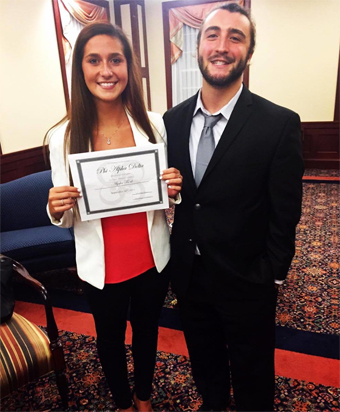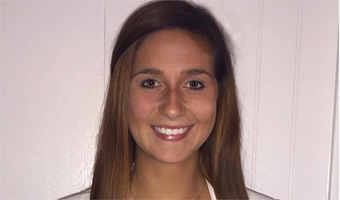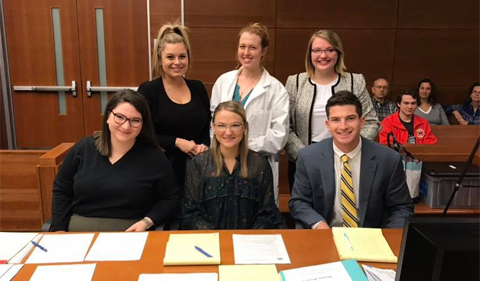By Nicole Rodriguez
After changing her major from biology to Sociology-Criminology, Alysha Funk decided to start preparing for law school and found an internship that would help her resume stand out from the rest.
Landing the Internship
“I’ve always had the idea of going to law school in the back of my head, so I switched my major to soc-crim because it had more options than a soc-pre law degree would,” says Funk. “It was something I could get a real job in if I decided not to go to law school, but I still wanted something that would prepare me for that.”
Funk found her internship through a friend, who connected her with the Law Director for the city for Athens, OH. She interviewed at the prosecutor’s office and was offered a position there on the spot.
“I actually had to change my resume a lot,” she says. “I included relevant classes…. Last semester for my research class I did a study of sexual assault on campus, so I included that. I also had to include references, but I included more academic references than job references.” For help creating her resume, she went to the Center for Law, Justice, and Culture and was assisted by Pre-Law Adviser Larry Hayman.
“I also just talked to one of my friends who graduated from here and is a professional now,” Funk says. “I talked to him about his resume and what he included, and that helped the most. I was able to send it and have him check it over, and he could show it to his boss and see what people were actually looking for.”
A Day on the Job
Funk’s typical day starts at 8 a.m., where she attends pre-trial hearings until 9:30. “[This is where] the prosecutor and the defendant come to an agreement. If they can’t come to an agreement then it will be sent for jury trial. We almost never have jury trials. If we have a jury trial, I go to that also. And I do a lot of paperwork,” says Funk. “I type up discoveries for the prosecutors, which is the paperwork saying: this is the evidence we have against your client.”
Before writing a discovery, Funk gets a copy of the ticket, the incident report, the victim, any witnesses, a police report, and sometimes security footage. “It’s like putting everything in one place,” she says. At the end of the discovery she lists everyone who could be called for trial and any previous charges the defendant has that are related to the case.
Funk’s responsibilities don’t end there. She runs occasional errands and shuffles some paperwork, but not without getting involved in what goes on in the courtroom.
“I review cases and I give the prosecutors my opinion, like if I would charge and what I would charge with,” she says. “I have to do legal research, looking up cases and finding similar situations and how the case came about. I have to create a pamphlet for victims of certain crimes that informs them of all their rights.”
Funk works in the municipal court, so she only tends to handle misdemeanors.
“The most aggressive charge we have is for things like assault, OVIs, and possession of marijuana,” she explains. “What’s been interesting for me is when we have people who are being held in felony court. Usually they also have a misdemeanor charge so they come in from the felony jail and they’re in their orange jumpsuit and they have to be handcuffed. That’s the first time I’ve seen something like that.”
This kind of exposure is valuable, because not everyone in Funk’s position has gotten this sort of hands-on education.
“My boss told me when she graduated law school she had never actually seen a jury trial, so for me to have already seen that is a pretty big deal. It’s a lot of good information to already know,” she says.
Looking Toward Law School

Funk, pictured with Dan Shisler, was a member of the law fraternity Phi Alpha Delta during her time at OHIO.
Funk graduated in December and plans to take a year off from school to study for the LSAT. She’s also been offered a paid internship at the prosecutor’s office, where she will be doing a lot of the same tasks, but taking on more hours. On top of this, she’ll still be working her other job in Columbus. She is confident that this internship experience, while not actually done for credit, will serve her well.
“It’s a huge deal for me, even more so than it would be for a regular student,” she says. “Seeing as I was a biology major first, my GPA is not where it could be. I think this experience will really help me [compensate] for that.”
Not only is she getting relevant work experience, but she’s making great networking connections.
“When I go to law school I can list the chief prosecutor of Athens, OH, on my resume. I can list the director of law for Athens, OH. Those are people of important positions.”
Words of Advice
Funk expressed that she initially intended to do her internship for credit, but quickly realized that working for the credit is a big time commitment. She emphasized that it is beneficial to go out and find these opportunities on your own, either through the school or not.
“I think [this internship] is the most important part of my education that I’ve had aside from the classes and the degree,” she says. “I think this is the most important thing education wise that I’m going to have on my resume. If you can fit it in, definitely do it.”




















5 Comments